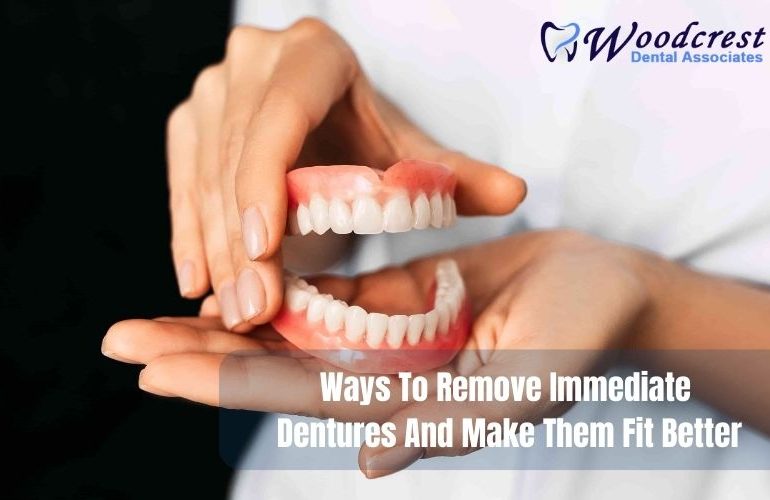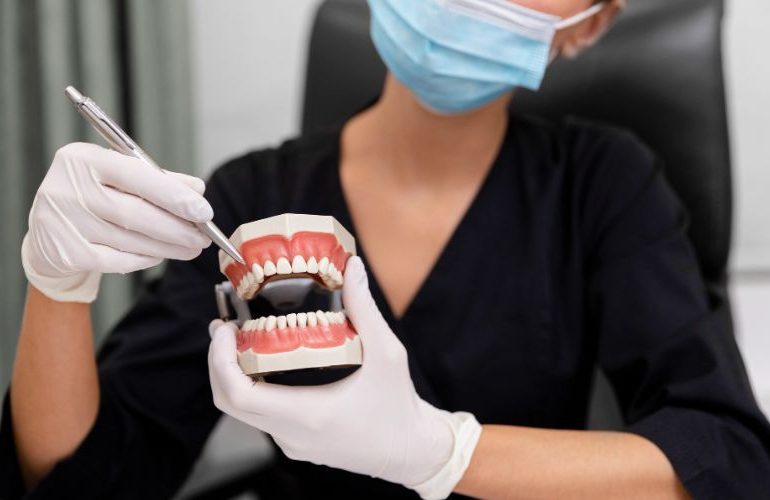Are you missing teeth and looking for a solution that can restore your smile? Dentures may be the answer! But did you know that there are different types of dentures available, each with its own benefits and drawbacks? In this blog post, we’ll explore everything from full to partial dentures so that you can make an informed decision about which option is right for you. So sit back, relax, and let’s dive into the world of dentures!
What are Dentures?
Dentures are a type of dental prosthetic that can be used to replace one or more missing teeth. They are typically made out of acrylic or porcelain and are supported by the gums and jawbone. Dentures can be either removable or fixed, and they can be customized to match the patient’s natural teeth.
There are two main types of dentures: complete dentures and partial dentures. Complete dentures are used to replace all of the teeth in the upper or lower jaw, while partial dentures only replace a few missing teeth. Partial dentures are typically held in place by metal clasps that attach to the remaining natural teeth.
Dentures can provide patients with many benefits, including improved chewing ability, better speech, and a more aesthetically pleasing smile. They can also help to preserve the shape of the face by preventing the collapse of the cheeks and lips. However, it is important to note that dentures do require some care and maintenance in order to keep them clean and free from bacteria.
Types of Dentures
When most people think of dentures, they think of a full set of teeth. However, there are actually several different types of dentures available, each with its own benefits and drawbacks. Here is a closer look at the most common types of dentures:
Full Dentures: As the name suggests, full dentures are a complete set of false teeth. They are typically used when all of the patient’s natural teeth have been removed. Full dentures can be either conventional or immediate. Conventional dentures are made after the removal of the natural teeth, while immediate dentures are made in advance and can be worn immediately after the natural teeth are removed.
Benefits: Full dentures are relatively affordable and easy to care for. They can also help improve the appearance of your smile and help you regain some chewing function.
Drawbacks: Full dentures can be difficult to get used to and may feel loose or uncomfortable at first. They also require special care to avoid damage and staining.
Partial Dentures: Partial dentures are used when some of the patient’s natural teeth remain in place. They consist of false teeth attached to a metal framework that fits around the existing teeth. Partial dentures can be either removable or fixed (also known as bridges). Removable partial dentures can be taken out for cleaning, while fixed partial dentures are permanently cemented in place.
Benefits: Partial dentures are less
Full Dentures
There are two main types of dentures: full and partial. Full dentures are used when all of the teeth in the upper or lower jaw need to be replaced. Partial dentures are used when some natural teeth remain in the mouth.
A full denture is a set of artificial teeth that replaces all of the teeth in an arch (upper or lower). A full denture is held in place by suction and gravity. It is important to keep your gums healthy so that your denture can fit snugly and stay in place. To clean your denture, remove it from your mouth and brush it with a soft-bristled toothbrush and mild soap. Be sure to rinse it thoroughly before putting it back in your mouth. You should also clean your gums, tongue, and palate with a soft-bristled toothbrush or gauze pad to remove plaque and food debris.
Partial Dentures
A partial denture is used when some natural teeth remain in the mouth. It consists of an artificial tooth or teeth attached to a metal frame that clips onto existing teeth. Partial dentures are usually made of acrylic (plastic) and metal. They are less expensive than full dentures but require more care because they must be cleaned daily to prevent plaque buildup on natural teeth and gum disease.
If you’re missing some teeth but not all of them, partial dentures are an option to consider. Partial dentures fill in the gaps left by one or more missing teeth, and they’re usually held in place by natural teeth or implants.
Like full dentures, partial dentures are made of artificial teeth mounted on a gum-colored base. They can be made of different materials, including acrylic, metal, or a combination of both. Partial dentures typically attach to your natural teeth with metal clasps or precision attachments.
If you’re considering partial dentures, it’s important to keep in mind that they may require more care than other types of dental prosthetics. That’s because they need to be cleaned regularly to prevent plaque and tartar buildup. Additionally, partial dentures can sometimes slip out of place, so you may need to adjust them from time to time.
Immediate Dentures
Immediate dentures are a type of denture that is inserted immediately after the removal of natural teeth. This type of denture is useful for people who do not want to go without teeth during the healing process. Immediate dentures are made from a mold of your teeth and gums, so they may not fit as snugly as regular dentures. It is important to see your dentist for regular checkups to ensure that your immediate dentures are still fitting properly.
Overdentures
An overdenture is a type of denture that covers and rests on top of one or more remaining natural teeth or dental implants. Overdentures offer a more secure fit and can help to preserve the health of your teeth.
If you are considering an overdenture, your dentist will first assess whether you are a good candidate for this type of denture. Factors that may influence the decision include the number and location of your remaining natural teeth, the condition of your gums, and your overall oral health.
Overdentures are typically made from acrylic or metal. The base of the overdenture fits over your existing teeth or implants, and the false teeth are attached to the base. Your dentist will work with you to choose the material that is best suited for your needs.
If you opt for an acrylic overdenture, you will need to have it relined periodically as your gum tissue changes shape. Metal overdentures are more durable and require less maintenance, but they may be more expensive upfront.
Before having an overdenture fitted, you will need to have any remaining natural teeth extracted. Once the area has healed, your dentist can take impressions of your mouth and fit you with a temporary denture while your permanent one is being made.
The process of getting used to an overdenture may take some time, but most people adjust within a few weeks. You should avoid eating hard or sticky foods at first, and be sure to
Advantages and Disadvantages of Dentures
When considering dentures, it’s important to weigh the advantages and disadvantages to find the best solution for your smile. Dentures have come a long way in recent years, and there are now more options than ever to choose from.
Dentures have some clear advantages. They can be much less expensive than other dental options like implants, and they can be removed and cleaned easily. Dentures can also help to improve your appearance and give you back your confidence.
However, there are also some drawbacks to consider. Dentures can be uncomfortable and take some time to get used to. They may also slip or click when you talk or eat, which can be embarrassing. And because they’re not anchored into your jaw like implants, they can sometimes feel unstable.
Ultimately, the decision of whether or not to get dentures is a personal one. But by understanding the pros and cons, you can make an informed choice that’s right for you.
Denture Care and Maintenance Tips
Dentures are a great way to restore your smile after tooth loss, but they require special care and maintenance to keep them looking and functioning at their best. Here are some tips for taking care of your dentures:
-Brush your dentures at least once a day with a soft-bristled brush and non-abrasive cleanser.
-Rinse your dentures after each meal to remove food particles and plaque.
-Soak your dentures in a mild cleansing solution overnight.
-Visit your dentist regularly for professional cleanings and checkups.
Conclusion
Denture types vary depending on your needs and lifestyle. Whether you need full dentures, partial dentures, or even immediate dentures, there is a suitable option out there for you. Before making any decision about which type of denture to go with it is always important to consult with your dentist to get the best advice for your particular situation. With the right information in hand, you can make an informed choice that will help improve your oral health and give you back that beautiful smile!
FAQs
If you have multiple missing teeth, or even just one tooth that is causing problems with eating or speaking, then dentures may be a good option for you. Your dentist can help you determine if dentures are the right solution for your needs.
There are two main types of dentures: complete and partial. Complete dentures are used to replace all of the teeth in the upper or lower jaw, while partial dentures only replace some of the teeth. There are also several different materials that dentures can be made from, including acrylic, porcelain, and metal.
It is important to brush your dentures daily with a soft-bristled brush and nonabrasive soap. You should also soak them overnight in a Dentu-Creme or similar cleansing solution. Be sure to handle them carefully to avoid breaking them.




